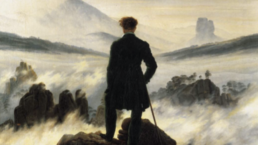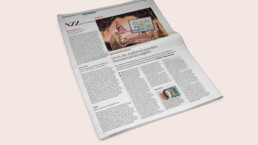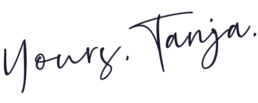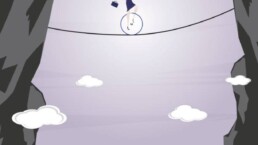
In this letter you find impulses on the magical endurance of uncertainty, on how to use cultivated intuition to make clear decisions, and on what inspired me recently on the subject of 'sustainability'. Last but not least: you can find the essential thoughts from my speech titled "From Rational to Emotional Thinking", which I gave to 250 managers in Zurich (in German).
Romanticism Today
So 2021 is going to be pink and cheesy? Not really, because the original meaning of romanticism has nothing to do with big red hearts and public marriage proposals. In the 19th century, Romanticism was an artistic outcry to break out from the chains of standardization. This was manifested above all by the desire for individuality, as a reaction to the industrialization of the time. This movement became palpable through abundant drama. In the visual arts, the eerie, the subconscious, the fantastic, the passionate, the individual, the emotional and the adventurous established themselves as central motifs, which were intended to break and expand the boundaries of the intellect and were directed against mere utilitarian thinking as well as industrialization. The intensive use of color is a salient feature of the romantic painters, seen for example in intense and dramatic sunrises, almost too beautiful to be true, or in one of the most famous paintings of this era: "The Wanderer above the Sea of Fog". This was how Caspar David Friedrichs represented the situation of the artist - the tormented genius, standing on the mountaintop and, at the same time, on the edge of existence, symbolized here by an abyss. Although a thick fog blocks the view, there is a suggestion of ultimate hope. This era created motifs that still awaken longings to this day. After a special year like 2020, which raised fundamental issues and made us question the status quo, certain voices of longing also become louder. One suddenly longs for the beautiful, the real, as well as for more profundity, and for that which gives one support and stability.

The “self” becomes important
An increased search for meaning has been observed as a trend for some time, and not just among the younger generation. At job interviews, applicants ask about the company's values and show interest in its social and societal responsibility. After all, today there is much more to a job than the accompanying title or the role it requires you to fulfil. It's about having a clear attitude, and that attitude has to match your own convictions. To start with, this requires clarity about oneself. In the medium term, it also leads to demarcation effects, in the professional and private environments. Living out one's character excludes some people, but also creates a stronger bond of attraction between like-minded people.
The inner call to do something meaningful is also reflected in the continuously increasing number of start-ups: +5.3% in Switzerland from 2019 to 2020, with 2019 already considered a record year. A mentality of creating can be observed. Indeed, these values show a clear trend towards "owning". We can only hypothesize about whether this is because companies may not have the right answers to the question of meaning or whether it is because the desire to break out of the classic career path is becoming greater. What is certain is that in recent years, a high value has been placed on standardization in many areas, because everything that is standardized brings scalability. Oh yes, that wonderful word! Scalability. The ability of the system or company to grow. That a certain parallel to the Romantic era - described above - can be seen here is, I think, an exciting insight. Thus, the increase in the number of new companies is not surprising. But what else could this mean? Three theses:
1. Expression of one's own individuality
The drive to break away from existing thought patterns is also driven by the uncertainty that lies ahead. The question of how my work can make a difference, and for whom, displaces the question of growth and more money. Focusing on your own values also makes you more frugal, because it answers the question of what you really need very honestly. One can observe a peeling off of one's own character, as evidenced by the shrinking closet, or the decluttering of an office or living room: We make ourselves lighter, or we gain profile.
2. Era of the artists
We have lost the ability to deal with uncertainty in our everyday business life. Our last years were more or less plannable, because the really big changes had perhaps been foreshadowed but had not (yet) shown themselves. It still worked out somehow. Now, many industries and thus also many jobs are uncertain, some may disappear and some may never even return. In conversations with artist friends, I often hear, almost jokingly, "That's nothing new for us". Artists are used to coping with uncertainty, and sometimes this feeling can even be a driver of creativity. This attitude prepares us for 2021.
3. The desire for enchantment
We have lost the magic in our interactions. I speak of magic deliberately, because what standardization has also brought is dry and relentless transparency. So much is predictable, and thus we have lost the magic. The gift of creating a magical moment is one that we just had the chance to experience at Christmas through the eyes of children, seeing their irrepressible anticipation of what Santa will bring. How can we manage to rekindle this glow in our eyes as well? This question will be homework for all of us in 2021.
What can these theses mean for the individual?
create and celebrate individual thoughts;
learn to think independently, outside of existing frameworks; and
cultivate the art of creating a context.
How does this work? With self-awareness, in the most literal sense.
What inspired me recently: the power of breaks
The biography of Irvin D. Yalom (arguably one of the most successful psychoanalysts of our time, as well as the author of bestsellers such as "When Nietzsche Wept") never ceased to amaze me as I read it. I found one recurring observation in it particularly intriguing. Yalom - who is 89 years old, married, the father of four adult children, and used to be a professor at Stanford University - would take breaks of up to six months from his daily life each time he devoted himself to a new topic, such as his textbook on group therapy, existential psychotherapy, or one of his many novels. During these breaks, Yalom would travel with his wife Marilyn, who was a professor of French literature. He emphasized several times in his biography how important this change of scenery was in broadening his perspective. There is certainly much to learn from Yalom, but this deceptively simple point can be adopted directly. Creation needs space and time - not only for artists, but also for scientists and entrepreneurs.

On my own behalf…
I am very happy to announce that Neue Zürcher Zeitung (NZZamSonntag) recently ran an article by me about the meaning of work. If you missed it, you can find it online or text me to get a copy.

Thank you for joining me for this episode of the Letter of Inspiration! Feel free to share this letter with colleagues and friends.

Share

